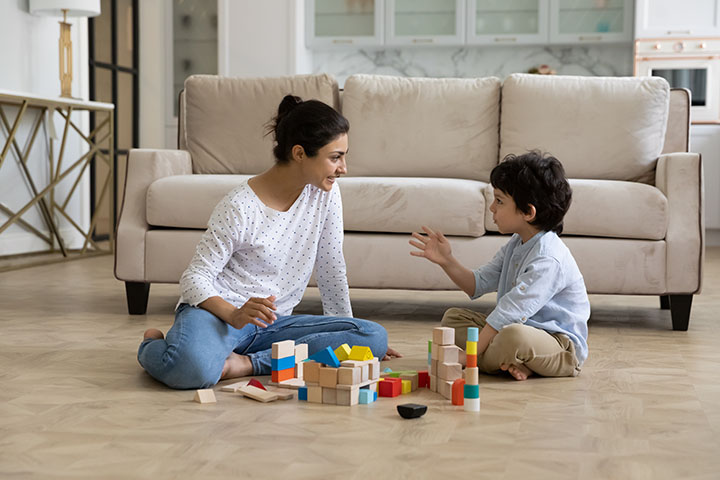
Image: Shutterstock
Parenting, undoubtedly, is no cake walk. The task of raising children brings with it both joys and challenges, and one of the most significant challenges is ensuring your kids grow up displaying good behavior. Yet, fear not! Despite the inevitable bumps along the way, with a bit of effort and the application of some tried-and-true strategies, you can guide your little ones toward developing better behavior. In this article, let’s delve into a practical list of tips, simple yet impactful, that can make a significant difference in shaping your children’s conduct. Read on to know more!
- Set Clear Expectations
Kids are like sponges, absorbing everything around them. Be crystal clear about what behavior you expect from them. Use straightforward language and make sure they understand the rules. Simple guidelines like “Be kind to others” or “Clean up after yourself” can go a long way.
- Positive Reinforcement
Image: Shutterstock
If you catch your kids being good,reward them with encouraging words. Whether it’s a simple “Great job!” or a high-five, positive reinforcement helps reinforce good behavior. This approach creates a connection between their actions and positive outcomes.
- Consistent Discipline
Consistency is key when it comes to discipline. If you let things slide one day and enforce rules strictly the next, confusion sets in. Be consistent in your responses to misbehavior, making it clear that certain actions have consequences. This helps your kids understand the boundaries and expectations.
- Lead By Example
Image: Shutterstock
Children often mimic the behavior of their parents, so, be a role model for the behavior you want to see. If you want your kids to be polite, respectful, and responsible, demonstrate these qualities in your own actions. Always remember, actions speak louder than words.
- Communicate Effectively
Open lines of communication with your kids. Encourage them to express themselves and share their feelings. By creating an environment where they feel heard and understood, you can build a stronger connection and reduce the likelihood of disruptive behavior as a means of communication.
- Create A Routine
Kids thrive on routine. Establish a daily schedule that includes regular mealtimes, playtime, and bedtime. Consistency in routine provides a sense of stability for children. It makes them feel more secure and less likely to act out.
- Teach Problem-Solving Skills
Image: Shutterstock
Help your kids develop problem-solving skills from an early age. Encourage them to think through situations and find solutions on their own. This not only empowers them but also promotes a sense of responsibility for their actions.
- Praise Effort, Not Just Results
While celebrating achievements is essential, it’s equally important to praise the effort your kids put into their tasks. This instills a growth mindset, teaching them that hard work and perseverance are valuable qualities, regardless of the outcome.
- Establish Consequences
Make sure your kids understand the consequences of their actions. Instead of focusing solely on punishment, use consequences as a learning opportunity. For instance, if they don’t finish their homework, they may miss out on playtime. Consistent consequences reinforce accountability.
- Encourage Independence
Image: Shutterstock
Allow your kids to take on age-appropriate responsibilities. This encourages a sense of independence and self-discipline. Whether it’s making their beds or packing their school bags, these small tasks teach responsibility and contribute to a well-behaved child.
- Provide Choices
Offering choices within limits gives your kids a sense of control. Instead of imposing strict directives, present options that align with your expectations. For example, let them choose between two acceptable snacks or decide when to complete their homework within a reasonable timeframe.
- Practice Empathy
Teach your kids the importance of understanding others’ feelings. Encourage them to put themselves in someone else’s shoes. Developing empathy helps cultivate kindness and consideration for others. It contributes to positive behavior in various social settings.
- Limit Screen Time
Image: Shutterstock
Excessive screen time can negatively impact behavior. Set reasonable limits on screen time, ensuring your kids engage in a variety of activities that promote physical, social, and cognitive development. A balanced lifestyle contributes to better behavior.
- Celebrate Small Victories
Acknowledge and celebrate the small victories your kids achieve. Whether it’s tying their shoelaces or sharing toys with a friend, recognizing these achievements boosts their confidence and reinforces positive behavior.
- Encourage Physical Activity
Image: Shutterstock
Regular physical activity not only promotes a healthy lifestyle but also helps channel excess energy in a positive way. Whether it’s playing sports, riding bikes, or simply going for a walk, physical activity contributes to a well-balanced and well-behaved child.
Encouraging good behavior in your kids involves a combination of clear communication, positive reinforcement, and leading by example. With these practical tips, you can go through the parenting journey more smoothly, creating a nurturing environment for your children to thrive. Remember, it’s the little things that add up to make a big difference in shaping your kids into well-behaved individuals.


















